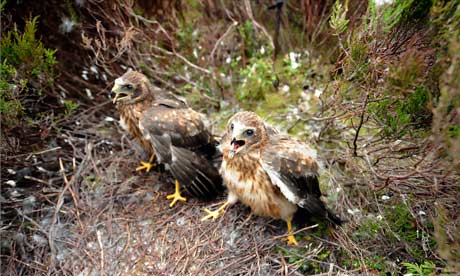
Ministers in Scotland are considering tougher legal controls to protect birds of prey on grouse moors as a new study claimed that last year was one of the worst for persecution of the wild predators by gamekeepers on record.
Senior ministers and officials in the Scottish government are closely studying proposals to licence grouse moors and make moor owners personally liable for the actions of their gamekeepers. The proposals, being studied in a new wildlife bill, could also mean that inspectors with Scotland's leading animal welfare charity would be given greater legal powers to investigate bird of prey cases – instead of the police.
The new measures were discussed by MSPs at the Scottish parliament as the RSPB claimed that 2009 was the second worst year for reported persecution cases across the UK in the last 20 years.
Its annual Birdcrime report said there 384 reported incidents involving poisoning, shooting, illegal trapping and nest disturbance against legally protected birds of prey last year. It said only cases reported in 2007 were higher, at 389 cases. The charity acknowledged that not all these reported cases were proven, but said there had been 85 confirmed incidents of poisoning and 32 confirmed cases of shooting against rare birds of prey such as golden eagles, sea eagles, red kites, buzzards, hen harriers and peregrines.
Leading landowners' organisations have repeatedly condemned the practice but last year there were 119 proven cases of persecution, compared to 89 in 2008 and a record 129 in 2007 across the UK. Many reported cases go unproven due to a lack of evidence.
Mark Avery, the RSPB's UK conservation director, said: "Wildlife crimes are an abhorrent feature of our countryside. We have to take more action to consign these crimes to history. Over time, egg collecting has diminished, but the killing of birds of prey is as big a threat today as it was two decades ago."
Avery urged UK ministers to introduce new powers of "vicarious liability" where landowners in England can be prosecuted for illegal persecution by their employees – similar to health and safety legislation which makes company directors liable for safety breaches in workplaces. This proposal is opposed by Scottish landowners groups who say existing laws are adequate but should be better enforced.
Similar powers are now being studied by Scottish ministers in the devolved government in Edinburgh for inclusion in a new wildlife and natural environment bill now going through the Scottish parliament.
Meanwhile, MSPs on the Scottish parliament's environment committee were urged by the Scottish Society for the Prevention of Cruelty of Animals (SSPCA) to give them added powers to investigate bird of prey persecution – a measure supported by the RSPB.
Unlike its English counterpart, the Royal Society for the Prevention of Cruelty to Animals (RSPCA), the SSPCA already has authority to report alleged cases of cruelty against domestic and farm animals directly to prosecutors, independent of the police.
It now wants the same legal authority to investigate cases where birds of prey are shot, poisoned or illegally trapped to be introduced in the new bill.
The new measures were heavily criticised yesterday by Sheriff Kevin Drummond QC, a judge expert in wildlife crime. He told the environment committee the existing laws on wildlife crime were already very complex and unwieldy and suggested further powers would further confuse the situation.
He said giving SSPCA inspectors, who were members of a charity, further powers and making employers liable for illegal acts by gamekeepers raised substantial questions about liberty, standards of evidence, and their supervision by the state.
"This whole subject has to be looked at in the context of criminal law, the presumption of innocence, the concept of reasonable doubt and the rules of evidence. That sometimes gets lost sight off in the environmental point of view," he said.
No comments:
Post a Comment